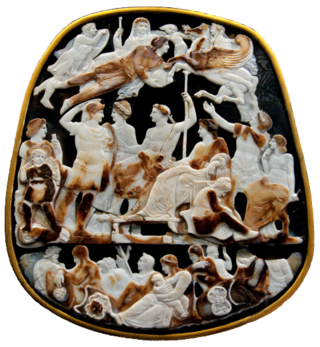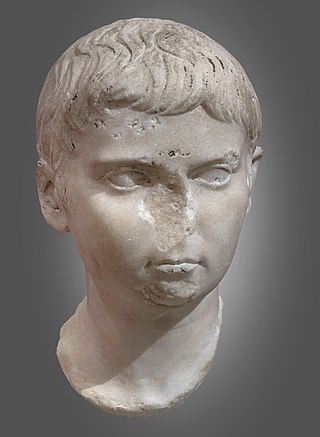
The Julio-Claudian dynasty comprised the first five Roman emperors: Augustus, Tiberius, Caligula, Claudius, and Nero.

Plautia Urgulanilla was the first wife of the future Roman Emperor Claudius. They were married circa 9 AD, when he was 18 years old. Suetonius writes that they were divorced in 24 AD on the grounds of her scandalous love affairs and the suspicion of murder.

Marcus Agrippa Postumus, later named Agrippa Julius Caesar, was a grandson of Roman Emperor Augustus. He was the youngest child of Marcus Vipsanius Agrippa and Julia the Elder. Augustus initially considered Postumus as a potential successor and formally adopted him as his heir, before banishing Postumus from Rome in AD 6 on account of his ferocia. In effect, though not in law, the action cancelled his adoption and virtually assured Tiberius' emplacement as Augustus' sole heir. Postumus was ultimately executed by his own guards shortly after Augustus' death in AD 14.

Claudia Livia was the only daughter of Nero Claudius Drusus and Antonia Minor and sister to Roman Emperor Claudius and general Germanicus, and thus paternal aunt of emperor Caligula and maternal great-aunt of emperor Nero, as well as the niece and daughter-in-law of Tiberius. She was named after her grandmother, Augustus' wife Livia Drusilla, and commonly known by her family nickname Livilla. She was born after Germanicus and before Claudius.

Drusus Julius Caesar, also called Drusus the Younger, was the son of Emperor Tiberius, and heir to the Roman Empire following the death of his adoptive brother Germanicus in AD 19.

Nero Julius Caesar was the adopted grandson and heir of the Roman emperor Tiberius, alongside his brother Drusus. Born into the prominent Julio-Claudian dynasty, Nero was the son of Tiberius' general and heir, Germanicus. After the deaths of his father and of Tiberius' son, Drusus the Younger, Nero and his brother Drusus were adopted together by Tiberius in September AD 23. As a result of being heirs of the emperor, he and his brother enjoyed accelerated political careers.
Junia Calvina was a Roman noblewoman who lived in the 1st century AD.
Marcus Scribonius Libo Drusus was a Roman accused of treason against the emperor Tiberius.
Marcus Livius Drusus Claudianus was a senator and praetor of the Roman Republic. He was born with the name Appius Claudius Pulcher, into the patrician family of the Claudii Pulchri but adopted by a Livii Drusi as a small child. His daughter Livia Drusilla became the wife of the first Roman Emperor Augustus, and he was a direct ancestor of the Julio-Claudian emperors Tiberius, Caligula, Claudius and Nero.

The Julii Caesares were the most illustrious family of the patrician gens Julia. The family first appears in history during the Second Punic War, when Sextus Julius Caesar was praetor in Sicily. His son, Sextus Julius Caesar, obtained the consulship in 157 BC; but the most famous descendant of this stirps is Gaius Julius Caesar, a general who conquered Gaul and became the undisputed master of Rome following the Civil War. Having been granted dictatorial power by the Roman Senate and instituting a number of political and social reforms, he was assassinated in 44 BC. After overcoming several rivals, Caesar's adopted son and heir, Gaius Julius Caesar Octavianus, was proclaimed Augustus by the senate, inaugurating what became the Julio-Claudian line of Roman emperors.

Lucius Salvius Otho was the father of the Roman emperor Otho. He was born of a distinguished and well-connected family on his mother's side. His close friendship with Tiberius, and physical similarity to him, led to rumours that he was Tiberius's son.
Marcus Furius Camillus was a Roman senator and a close friend of the emperor Tiberius. Despite being without previous military experience, he enjoyed several successes against the Numidian rebel Tacfarinas while serving as governor of Africa, and was even praised in public by the Emperor and awarded triumphal honours. The historian Tacitus, in his Annales, joked that Camillus subsequently lived invisibly enough to survive this great honour.
Lucius Arruntius Camillus Scribonianus was a Roman senator, who was active during the reign of Tiberius. He was consul in AD 32. Ten years later, he revolted against the emperor Claudius, but was swiftly defeated.
Marcus Livius Drusus Libo was an ancient Roman consul of the early Roman Empire. He was the son of Lucius Scribonius Libo and adopted brother of the empress Livia. His natural paternal aunt was Scribonia, the second wife of Augustus, as a consequence of which he was a maternal first cousin of Julia the Elder.
Libo Rupilius Frugi was a Roman senator and an ancestor of the emperor Marcus Aurelius. He served as suffect consul in 88.

The gens Vibia was a plebeian family at ancient Rome. Although individuals named Vibius appear in history during the time of the Second Punic War, no members of this gens are found at Rome until the final century of the Republic. The first of the Vibii to obtain the consulship was Gaius Vibius Pansa in 43 BC, and from then until imperial times the Vibii regularly filled the highest offices of the Roman state. The emperors Trebonianus Gallus and Volusianus each claimed descent from the family.
The gens Arruntia was a plebeian family at ancient Rome. Members of this gens first came to prominence during the final years of the Republic.
Lucius Arruntius was a Roman senator praised by the ancient Roman historian Tacitus. He lived throughout most of the reigns of the two first Roman emperors, Augustus and Tiberius. In 6 AD he was appointed consul, and then governor of Hispania Tarraconensis around 25 AD, which he governed in absentia for over 10 years. Throughout the latter part of his life he was plagued by hostility from the Praetorian Guard prefects, Sejanus and Macro, which culminated in his suicide in 37 AD after being arraigned on a trumped-up charge of irreverence to the then-emperor Tiberius.

Tiberius Claudius Drusus was the eldest son of the Roman Emperor Claudius with his first wife Plautia Urgulanilla. He had one younger sister, Claudia, who was repudiated by Claudius along with Plautia.
Lucius Annius Vinicianus was a Roman senator during the Principate. He is best known for his involvement in the assassination of Caligula and a rebellion against Claudius.










